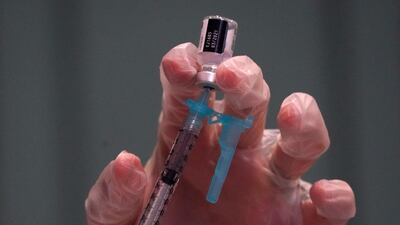UN Secretary General Antonio Guterres called for more money to distribute Covid-19 vaccines to poor countries on Friday as the planet passed the “heart-wrenching milestone” of two million deaths from the disease.
The UN chief said rich nations are stockpiling vaccine supplies and called for funds for the Covax programme, co-led by the UN's World Health Organisation, which supplies impoverished regions with cheap jabs.
“Vaccines are reaching high-income countries quickly, while the world’s poorest have none at all,” Mr Guterres said in a statement.
“We are committed to making sure that vaccines are seen as global public goods — people’s vaccines.”
The US, Canada, Britain, France, Germany and other rich countries have cut deals directly with drugmakers, meaning that much of the world’s vaccine supply this year is already reserved.
The cash-strapped Covax programme aims to make two billion doses of safe and effective Covid-19 vaccines available by the end of 2021.
Mr Guterres bashed rich countries for making "side deals" and buying more vaccine supplies than were needed to inoculate their populations in what he called "vaccinationalism".
“Covid-19 cannot be beaten one country at a time,” he said.
“We need manufacturers to step up their commitment to work with the Covax facility and countries around the world to ensure enough supply and fair distribution.”
The virus has claimed two million lives, infected more than 93 million people and forced societies around the world into lockdown since it was first discovered in central China at the end of 2019.
The pandemic has also slowed the growth of international migration by 27 per cent, meaning two million fewer people migrated last year than expected, a UN report said on Friday.
Mesfin Teklu Tessema, a health director for the International Rescue Committee, said this week that most people living in crisis and conflict zones will likely not get jabs this year.
“To ensure no one is left behind, investments must be made immediately to strengthen health systems,” he said in a statement.
The aid group also called for rich countries to share their “know-how and intellectual property” more freely.
Speedily-developed vaccines were distributed at the end of last year, but getting jabs in the arms of health workers, the elderly and other vulnerable people has taken longer than expected, especially in Europe.
In the US, president-elect Joe Biden is set to outline plans on Friday to ramp up vaccinations as he prepares to take office amid soaring infection rates and an early campaign by the Trump administration he called “a dismal failure”.
Mr Biden's $1.9 trillion rescue package features stimulus checks and aid for the unemployed and those facing eviction. It also includes support for small businesses and more money for vaccinations and testing.
China is making headway against Western drugmakers in developing nations, with Turkey and Indonesia beginning huge campaigns featuring Chinese-made shots this week, with Brazil and Hungary expected to follow suit.
A YouGov opinion poll on Friday suggested that people were generally likely to say yes to receiving Covid-19 jabs, but were keener on shots made in Germany and the US than those from China and Russia, Reuters reported.


